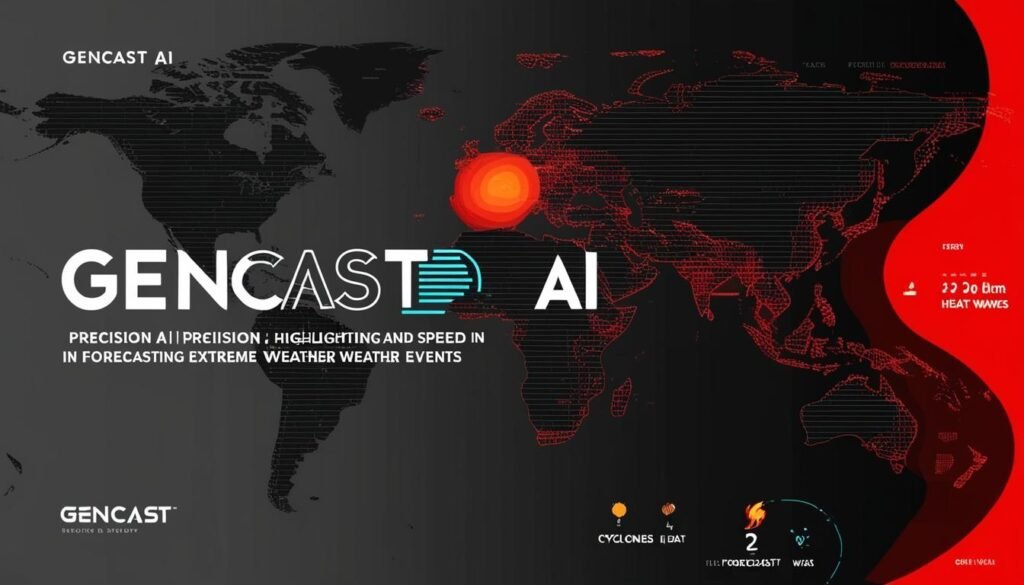Google DeepMind’s new AI model GenCast outperforms traditional forecasting systems, offering faster and more accurate predictions crucial for climate and energy planning.
Google DeepMind has unveiled a groundbreaking advancement in weather forecasting with its latest generative AI model, GenCast, which demonstrates a marked improvement over the world-renowned European Centre for Medium-Range Weather Forecasts’ (ECMWF) ENS system. GenCast has been reported to provide forecasts that are 20% more accurate than those produced by ENS, solidifying its position as a formidable tool in the realm of meteorology.
GenCast not only excels in accuracy but also boasts remarkable speed in generating forecasts. The AI technology can compute a 15-day weather prediction in just 8 minutes, a significant reduction when compared to the hours traditionally required by supercomputers. This leap in efficiency is poised to transform the availability and reliability of weather predictions, offering timely data to decision-makers across various sectors.
The significance of accurate weather forecasting cannot be overstated, especially as climate change leads to an increase in the frequency and severity of extreme weather events. GenCast leverages four decades of historical weather data, integrating it with cutting-edge generative AI capabilities to enhance clarity and insight. “Outperforming ENS marks something of an inflection point in the advance of AI for weather prediction,” stated Ilan Price, a research scientist at Google DeepMind.
The technological advancements presented by GenCast include notable accuracy gains, with the model surpassing ENS in accuracy on 97.2% of forecasting targets. It displays exceptional proficiency in predicting phenomena such as cyclones, heat waves, and high winds. Furthermore, its rapid processing power allows for improved tracking of extreme weather events, providing essential information on hurricane trajectories and wind speeds which is critical for both human safety and infrastructure planning.
To achieve its predictive power, GenCast employs a diffusion AI model specifically adapted to Earth’s spherical geometry. The model generates ensembles of over 50 forecasts that capture various potential scenarios, enabling it to account for uncertainties and avoid overconfidence—an approach particularly useful for forecasting extreme events. Steven Ramsdale from the UK Met Office remarked on the innovation, stating, “The work is exciting,” while the ECMWF acknowledged it as “a significant advance” in the field of weather forecasting.
However, experts advise caution as the integration of AI in weather prediction comes with its challenges. AI models like GenCast face limitations in replicating the “butterfly effect,” which is vital for making long-term forecasts. “There is still a long way to go before machine learning approaches can completely replace physics-based forecasting,” cautioned Sarah Dance, a professor at the University of Reading.
Looking ahead, GenCast is set to play a crucial role in complementing traditional forecasting methods, positioning itself as a central player in the landscape of climate and energy planning. With its proven ability to deliver results with unparalleled speed and precision, the future of weather prediction is increasingly intertwined with advancements in artificial intelligence, offering a promising avenue for adaptation in a rapidly changing environmental context.
Source: Noah Wire Services
- https://www.smithsonianmag.com/smart-news/google-reveals-new-ai-model-that-predicts-weather-better-than-the-best-traditional-forecasts-180985608/ – Corroborates GenCast’s accuracy and speed, outperforming the ECMWF’s ENS system, and its ability to predict extreme weather events.
- https://www.cnet.com/tech/services-and-software/googles-new-ai-weather-model-nails-15-day-forecasts/ – Supports the claim that GenCast can generate a 15-day forecast in just eight minutes and its superior predictions, including tracking tropical cyclone paths.
- https://programbusiness.com/news/ai-weather-forecast-gencast-outperforms-leading-system-in-day-to-day-predictions/ – Confirms GenCast’s 20% higher accuracy than ENS, its rapid forecasting abilities, and its use of historical weather data.
- https://www.smithsonianmag.com/smart-news/google-reveals-new-ai-model-that-predicts-weather-better-than-the-best-traditional-forecasts-180985608/ – Details the significance of GenCast’s accuracy gains, including its proficiency in predicting cyclones, heat waves, and high winds.
- https://www.cnet.com/tech/services-and-software/googles-new-ai-weather-model-nails-15-day-forecasts/ – Explains GenCast’s use of a diffusion AI model and its ability to generate multiple forecasts to account for uncertainties.
- https://programbusiness.com/news/ai-weather-forecast-gencast-outperforms-leading-system-in-day-to-day-predictions/ – Highlights the importance of GenCast’s rapid processing power for tracking extreme weather events and its implications for human safety and infrastructure planning.
- https://www.smithsonianmag.com/smart-news/google-reveals-new-ai-model-that-predicts-weather-better-than-the-best-traditional-forecasts-180985608/ – Quotes Ilan Price on the significance of GenCast outperforming ENS and its impact on the advancement of AI in weather prediction.
- https://www.cnet.com/tech/services-and-software/googles-new-ai-weather-model-nails-15-day-forecasts/ – Mentions the training of GenCast on 40 years of historical weather data and its integration with generative AI capabilities.
- https://programbusiness.com/news/ai-weather-forecast-gencast-outperforms-leading-system-in-day-to-day-predictions/ – Discusses the potential of GenCast to complement traditional forecasting methods and its role in climate and energy planning.
- https://www.smithsonianmag.com/smart-news/google-reveals-new-ai-model-that-predicts-weather-better-than-the-best-traditional-forecasts-180985608/ – Addresses the challenges of AI in weather prediction, including the limitation in replicating the ‘butterfly effect’ for long-term forecasts.
- https://www.cnet.com/tech/services-and-software/googles-new-ai-weather-model-nails-15-day-forecasts/ – Notes the future role of GenCast in enhancing weather prediction with its speed and precision, especially in a rapidly changing environmental context.


